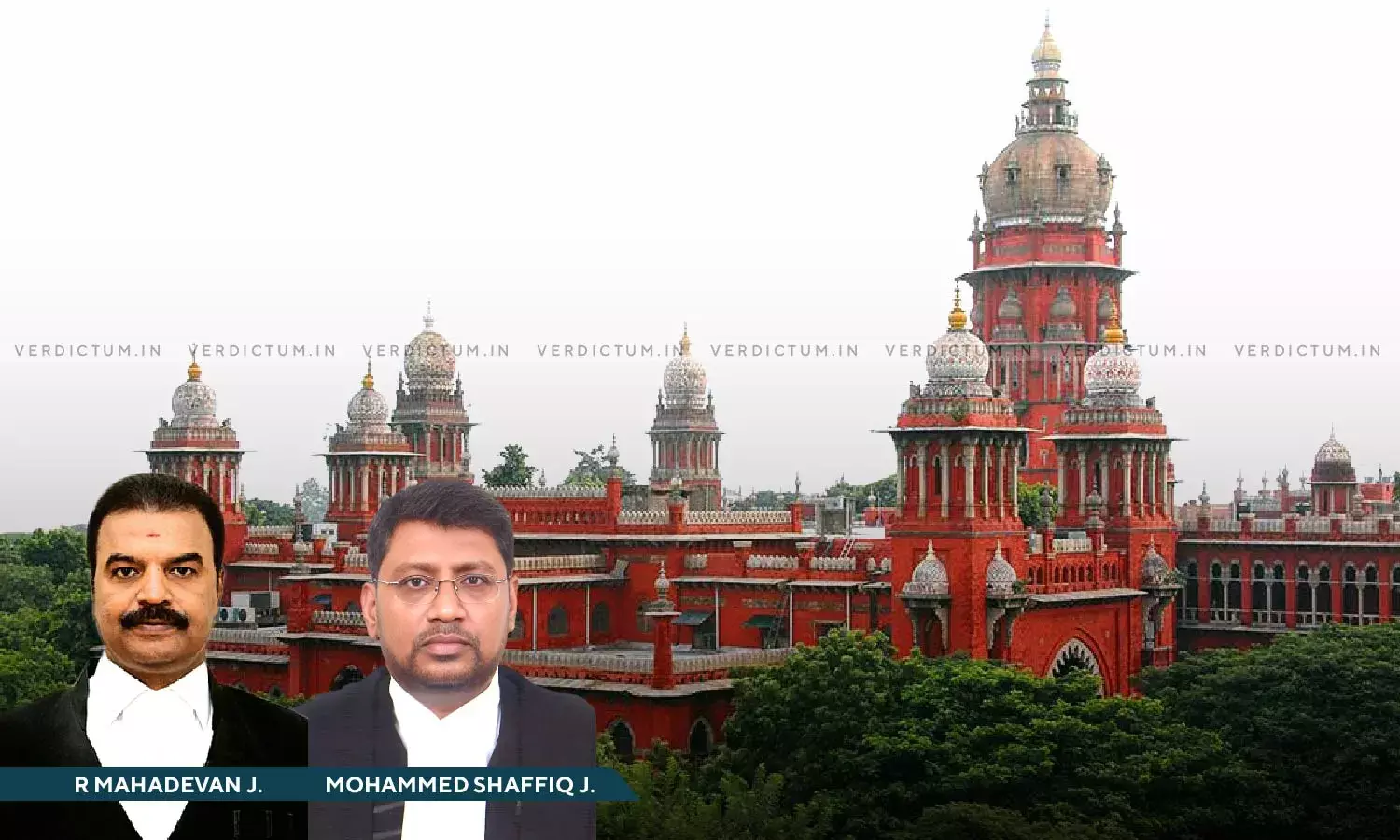Madras HC Constitutes 2-Member Committee To Enquire Into ‘Illegalities’ In Appointment Of Assistant Professors In Institutions Of Pachaiyappa’s Trust

The Madras High Court in an appeal regarding the appointment of 254 candidates to the institutions of Pachaiyappa's Trust, constituted a two-member committee comprising Justice B. Gokuldas (Retired) as Chairman and an ex-principal of Quaid-e-Millath Government College for Women as a member to facilitate the proceedings. The committee has been tasked with providing expert assistance and creating a comprehensive report on the appointments in question.
The Bench comprising Justice R. Mahadevan and Justice Mohammed Shaffiq held, “This Court constitutes a two member Committee comprising of the Hon'ble Mr. Justice B.Gokuldas (Retired), High Court of Madras, as Chairman and Dr. (Mrs.) D. Freeda Gnana Rani, Ex.Principal of Quaid-e-Millath Government College for Women, Chennai, as Member to render her expert assistance to the former, to make a detailed report on the appointments of 254 candidates to the post of Assistant Professors in the institutions of the Pachaiyappa’s Trust pursuant to the recruitment notifications dated 12.12.2013 and 18.02.2014…The Committee shall look into the requisite qualifications and eligibility criteria as prescribed under the recruitment notifications under which the appointments have been made, look into the respective qualifications and other eligibility criteria of every appointee, and go on to state if the appointee is eligible to be appointed or not”.
Advocate M. Renukadevi appeared for the Appellant and Advocate S. Shanthi appeared for the Respondent.
A set of Writ Appeals were filed challenging the impugned judgement of the Trial Court, wherein the Court quashed 254 appointments to the post of Assistant Professor in the institutions of the Pachaiyappa’s Trust. The Respondent had filed a writ petition challenging the validity of the appointments. The Appellants contended that the in the writ petition before the trial court, the Respondent did not have any locus standii.
The Court acknowledged that there were severe irregularities in the appointments made to the teaching faculties of the Trust's colleges and institutions. While some appointees may have had the necessary qualifications, it appeared that many appointments made under the two recruitment notifications are controversial. Despite receiving reports from the Administrator and the Director of Collegiate Education, there was still no clarity or agreement, and different parties have made conflicting claims. In view of these circumstances, the Court observed that it could not overlook the numerous illegalities, allegations, and irregularities that have tarnished the Trust's institutions and eroded public trust in the selection process for public employment.
“While some of the persons appointed may be well-qualified, it can easily be said that most appointments made pursuant to the two recruitment notifications, have been mired in controversy. It may also be placed on record that inspite of two Reports made by the Administrator (dated 30.7.2020) as well as the Director of Collegiate Education (dated 15.11.2022), clarity and consensus still eludes us, and several rival and competing claims and contentions have been made by the parties. This Court, in such view of the matter, cannot shut its eyes to the glaring illegalities, allegations and irregularities that have brought the institutions of the Trust, ignominy, to say the least. It has also resulted in disillusionment and lack of trust in the method of selection, in public employment”, the Bench asserted.
The Court recognized that appointments made without meeting the necessary eligibility requirements should be invalidated as they violate the principle of equality enshrined in Article 14 and the right to equal opportunities under Article 16. However, it is also important to consider the rights of qualified candidates who have already worked for over eight years.
The Court highlighted that it would be unfair to cancel the appointments entirely as it would cause hardship to the already employed qualified candidates and result in a grave injustice, contradicting the principle of equality.
In this context, the Court observed “While it is our view that all illegal appointments i.e. appointments of persons/candidates not possessing the requisite eligibility criteria, are to be struck down without a second thought, being against the doctrine of equality embodied in Article 14 and the fundamental right to equality of opportunity in public employment under Article 16 of the Constitution, it is equally important to have in mind the interests of the qualified candidates, who have already worked for more than eight years and whose right to public employment cannot also be interfered with unnecessarily for no fault on their part. Keeping in mind the principle that unequals cannot be treated equally, and that, those who were qualified, cannot be dealt with in the same manner as unqualified candidates appointed illegally without possessing necessary qualifications, this Court is not in favour of omnibus quashing of all appointments, as that would be painting everyone with the same brush, which, in the circumstances stated above, would not stand scrutiny before law and would amount to gross injustice and offend the equality doctrine”.
Therefore, the Court noted that the writ petitions were sustainable owing to numerous allegations regarding irregularity in appointments and could not be rejected on hypertechnical grounds of maintainability and locus standii.
Accordingly, the Court listed the matter for September 29.
Cause Title: P Elangovan v R Prema Latha

